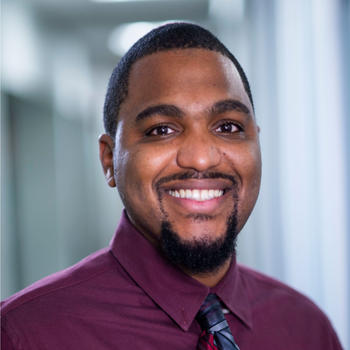In This Story

Pride Month, recognized each year in June, celebrates LGBTQ+ individuals. The month of June commemorates the historic Stonewall Protest of 1969, an event that transformed and uplifted the LGBTQ+ rights movement. June is also the month in which same-sex marriage was legalized, a landmark event in the LGBTQ+ liberation movement.
While LGBTQ+ rights have made great strides, the community still faces barriers to comprehensive, inclusive, and equitable health care. Today, we have a greater understanding of the more intricate challenges the community faces, including how LGBTQ+ people with additional intersecting identities face unique barriers to health equity.
With funding from the National Institutes of Health (NIH), Rodman Turpin, assistant professor in the Department of Global and Community Health, strives to increase the use of HIV pre-exposure prophylaxis (PrEP), among Black sexual minority men in Prince George’s County. His recent work also sheds light on the importance of parental support for mental health among Black sexual minority men and transgender women. This Pride Month, Turpin shares his expertise on the intersections of racial/ethnic identities and sexual identities, specifically Black sexual minority men.
What is the definition of Black Sexual Minority Men (BSMM)?
Black Sexual Minority Men, or BSMM, refers to Black men who are attracted to or have sexual contact with people of the same gender.
What unique forms of discrimination do BSMM face?
BSMM exist at the unique intersection of being both racial and sexual minorities. Each identity faces forms of marginalization on their own, but when compounded together, it creates an additional layer of social stigma BSMM must navigate. Community social norms or religious beliefs place BSMM at risk of potential ostracization from friends and family due to stigmatized views of queer sexuality. In addition, BSMM may experience negative racial bias while operating in predominantly white spaces as well as isolation from within their communities.
Why are race/ethnicity relevant when discussing sexually transmitted infection (STI) testing, especially among BSMM?
Black communities both historically and currently face discrimination and mistreatment by the medical system, which deters not only BSMM, but also Black communities more broadly, from seeking medical care. Additionally, sexual minorities are often stigmatized, misunderstood, or similarly discriminated against. In totality, this results in BSMM having greater difficulty utilizing care, and often receiving less competent care when utilized. This highlights the need for greater structural changes in health care systems, including those providing STI testing services. Cultural competency efforts, including continual training and education, are essential to rebuild trust and ensure equitable care.
What are effective ways to increase STI testing among racial/ethnic and sexual minority groups?
No community is a monolith, so there is no one-size fits all approach. The approaches we develop to promote HIV/STI testing for BSMM should be tailored to each person’s individual needs, relationships, and social context. There are actionable steps the health care system can take:
-
Health care providers should be trained to create a comfortable and trusting environment where BSMM can safely disclose this information without judgment or discrimination.
-
Addressing the social factors and structural barriers that impact a person’s health-related behaviors by providing resources to accessible HIV/STI testing.
-
Creating and disseminating messages that dispel the misinformation surrounding HIV/STI that results in social stigmatization.
-
Facilitating open communication with the affected population on the importance of STI testing. Promoting HIV/STI testing for BSMM requires both listening to and collaborating with our community.
-
Collaborating with community-based organizations, including those serving and led by BSMM, is especially important for bridging gaps in testing.
##
Dr. Rodman Turpin is an assistant professor in the Department of Global and Community Health. His research focuses the intersectionality of racism, homophobia, and related stigma as key social determinants of health and intervention targets. Turpin explores relationships between these factors and HIV and STI prevention among racial/ethnic and sexual minorities, particularly BSMM. Community and research partnerships, including collaboration with community-based organizations, are core elements of his research.
To speak to Dr. Turpin, contact Michelle Thompson at mthomp7@gmu.edu.
About George Mason University
George Mason University is Virginia’s largest public research university. Located near Washington, D.C., Mason enrolls more than 40,000 students from 130 countries and all 50 states. Mason has grown rapidly over the past half-century and is recognized for its innovation and entrepreneurship, remarkable diversity, and commitment to accessibility. In 2023, the university launched Mason Now: Power the Possible, a one-billion-dollar comprehensive campaign to support student success, research, innovation, community, and stewardship. Learn more at gmu.edu.
About College of Public Health at George Mason
The College of Public Health at George Mason University is the first and only College of Public Health in Virginia combining public health transdisciplinary research, education, and practice in the Commonwealth as a national exemplar. The College enrolls more than 1,900 undergraduate and 1,300 graduate students in our nationally recognized programs, including six undergraduate degrees, eight master’s degrees, five doctoral degrees, and six professional certificate programs. The College is comprised of the School of Nursing and the Departments of Global and Community Health, Health Administration and Policy, Nutrition and Food Studies, and Social Work.
